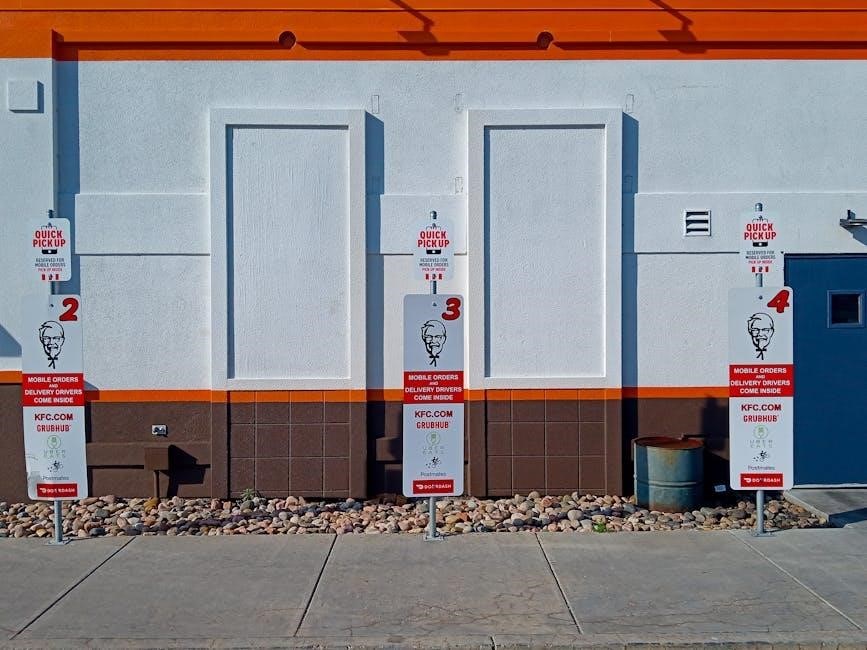Empowering urban consumers to navigate modern markets, this guide explores sustainable practices, technology integration, and budgeting strategies, addressing diverse needs and emerging trends in urban consumption.
Understanding the Urban Consumer Landscape
Urban consumers operate in a dynamic, fast-paced environment shaped by technological advancements, sustainability concerns, and diverse cultural influences. The urban landscape is characterized by dense populations, high disposable incomes, and access to a wide range of products and services. However, challenges such as affordability crises and environmental awareness also play a significant role. Consumers increasingly prioritize eco-friendly and ethical choices, while digital tools and AI-driven personalization reshape shopping experiences. Understanding this complex interplay is crucial for meeting urban consumers’ evolving needs and preferences, ensuring they navigate the market effectively while aligning with broader societal goals.
Why Urban Consumers Need a Guide
Urban consumers face a complex landscape of choices, from sustainability to digital shopping, requiring informed decision-making. This guide helps navigate the challenges of modern urban life, ensuring consumers can identify ethical practices, budget effectively, and leverage technology. With insights into emerging trends and practical strategies, it empowers individuals to make choices that align with their values and financial goals, addressing the unique demands of city living while fostering a more conscious and efficient approach to consumption.

Understanding Urban Consumer Needs
Urban consumers have diverse needs shaped by lifestyle, preferences, and challenges, requiring tailored solutions to enhance their quality of life in dynamic city environments.
Demographic Analysis of Urban Consumers
Urban consumers vary widely in age, income, education, and occupation, shaping their purchasing behaviors. Millennials and Gen Z dominate city populations, prioritizing convenience and digital connectivity. Higher education levels and diverse cultural backgrounds influence brand preferences and spending patterns. Income disparities exist, with affluent professionals and budget-conscious students coexisting. Understanding these demographics helps tailor products and services to meet specific urban needs. This diversity drives demand for personalized and culturally relevant offerings, making demographic insights crucial for effective marketing strategies in urban markets.
Lifestyle Factors Influencing Urban Consumption
Urban consumers’ lifestyles significantly shape their consumption patterns. The fast-paced, diverse environment of cities influences purchasing decisions, with a focus on convenience, accessibility, and experiences. Cultural diversity and exposure to global trends drive demand for varied products. Urban lifestyles often prioritize work-life balance, leading to increased spending on health, wellness, and leisure. Additionally, the concentration of entertainment, dining, and retail options in cities fosters a culture of exploration and experimentation. These factors create a dynamic market where consumer preferences evolve rapidly, driven by both necessity and aspiration.

Psychographic Traits of Urban Shoppers
Urban shoppers often exhibit distinct psychographic traits, such as a strong emphasis on convenience, technology adoption, and sustainability consciousness. They tend to value experiences over material possessions and prioritize brands that align with their personal values. Urban consumers are also more likely to engage with trends, seek unique offerings, and support socially responsible businesses. Their diverse backgrounds and exposure to global cultures foster a cosmopolitan mindset, influencing their purchasing decisions. These traits create a sophisticated consumer base that demands innovation, quality, and alignment with their lifestyles and ethical standards.

Sustainable Consumption in Urban Areas
Sustainable consumption in urban areas is vital for minimizing environmental impact, fostering eco-conscious behaviors, and enhancing community well-being while supporting long-term planetary health.
Buying Local and Reducing Carbon Footprint
Buying local products is a cornerstone of sustainable urban living, cutting down on transportation emissions and supporting local economies. Urban consumers can reduce their carbon footprint by prioritizing goods from nearby farms, artisans, and businesses. Local purchases often ensure fresher products, lower packaging needs, and a stronger connection to the community. By choosing local, consumers help minimize the environmental impact of long-distance shipping while fostering economic growth. This practice not only benefits the planet but also enhances the vibrancy of urban neighborhoods, making it a win-win for sustainability and community well-being.
Waste Reduction and Recycling Practices
Urban consumers can significantly reduce their environmental impact by adopting waste reduction and recycling practices. Start by minimizing single-use items, composting organic waste, and repurposing household goods. Recycling programs, including paper, glass, and plastic, help conserve resources and reduce landfill use. Properly sorting recyclables and participating in community collection drives can make a difference. Additionally, supporting businesses with sustainable packaging and buying in bulk can further minimize waste. By embracing these habits, urban consumers contribute to a cleaner, more sustainable city while promoting eco-friendly living practices.
Eco-Friendly Product Choices
Urban consumers play a vital role in promoting sustainability by selecting eco-friendly products. These products are made from sustainable materials, such as bamboo, recycled plastics, or organic fabrics, reducing environmental harm. Look for items with minimal packaging, energy-efficient designs, or non-toxic ingredients. Certifications like Energy Star or Fair Trade ensure ethical production. Choosing eco-friendly options supports green innovation and reduces carbon footprints. Urban shoppers can easily find these products in local stores or online, making sustainable living accessible and convenient while contributing to a healthier planet;

Budgeting and Saving for Urban Consumers

Urban consumers face high living costs, making budgeting and saving essential for managing expenses and ensuring financial stability. Smart financial habits help navigate city life challenges.
Effective Budgeting Strategies
Urban consumers can adopt practical budgeting strategies to manage their finances efficiently. Tracking expenses through apps or spreadsheets helps identify spending patterns and areas for reduction. Creating a detailed budget plan, categorizing needs vs. wants, and prioritizing essential spending are key steps. Automating savings through direct deposits or apps ensures consistent saving. Implementing the 50/30/20 rule—allocating 50% to needs, 30% to discretionary spending, and 20% to savings—provides a balanced approach. Regularly reviewing and adjusting budgets helps urban consumers stay financially stable and achieve long-term goals.
Identifying Deals and Discounts
Urban consumers can maximize savings by identifying deals and discounts through various strategies. Subscribing to newsletters, following brands on social media, and using coupon apps like Honey or Rakuten can uncover hidden offers. Timing purchases during seasonal sales, end-of-stock clearances, or holiday promotions often yields significant discounts. Price comparison tools and deal websites like Slickdeals or RetailMeNot help find the best bargains. Additionally, cashback apps such as Ibotta or Rakuten offer rebates on everyday purchases, further enhancing savings for urban shoppers seeking value in their busy lifestyles.
Avoiding Unnecessary Expenses
Urban consumers can reduce financial strain by avoiding unnecessary expenses. Prioritizing needs over wants helps allocate resources effectively. Impulse purchases, especially on trendy items, often lead to wasted money. Regularly reviewing subscription services, like unused gym memberships or streaming platforms, can save significant funds. Planning meals and avoiding last-minute dining out reduces overspending. Additionally, avoiding costly convenience services and opting for DIY solutions can further cut costs. By adopting a mindful spending habits, urban consumers can allocate their budgets more efficiently and achieve long-term financial stability.

Role of Technology in Urban Shopping
Technology empowers urban consumers, offering seamless shopping experiences through apps, digital payments, and data-driven insights, enhancing convenience and efficiency in the modern retail landscape.
E-Commerce and Online Shopping Trends
E-commerce has revolutionized urban shopping, offering unparalleled convenience through mobile apps, AI-driven recommendations, and fast delivery services. Urban consumers increasingly rely on online platforms for everything from groceries to luxury goods, driven by time-saving benefits and access to global brands. The rise of social commerce and influencer marketing further accelerates online purchasing decisions. Additionally, features like virtual try-ons and augmented reality enhance the digital shopping experience, making e-commerce a cornerstone of modern urban retail.
Price Comparison Tools and Apps
Price comparison tools and apps empower urban consumers to make informed purchasing decisions by providing real-time data on product prices across various retailers. These platforms highlight discounts, coupons, and promotions, enabling shoppers to maximize savings. Popular apps use barcode scanning, price history tracking, and user reviews to enhance decision-making. By leveraging these tools, urban consumers can avoid overspending and identify the best value for their money, ensuring smarter and more efficient shopping experiences in a fast-paced urban environment.
Digital Payment Methods and Security
Digital payment methods, such as mobile wallets, contactless cards, and buy-now-pay-later services, are transforming urban shopping. These tools offer convenience, speed, and seamless transactions. Security is a top priority, with features like encryption, tokenization, and biometric authentication protecting consumer data. Urban consumers can also monitor spending and detect fraud through real-time alerts. As digital payments evolve, technologies like blockchain and decentralized systems promise even greater security and transparency, ensuring safe and efficient transactions in the urban marketplace.

Health and Wellness for Urban Consumers
Urban consumers prioritize health and wellness through access to organic food, fitness services, and mental well-being resources, reflecting sustainable lifestyle trends in urban environments;
Access to Organic and Healthy Food Options
Urban consumers increasingly prioritize access to organic and healthy food options, driven by rising health consciousness. Cities now feature numerous organic markets, specialty stores, and farmers’ markets, offering fresh, chemical-free produce. The demand for sustainable agriculture has also led to urban farming initiatives, providing residents with locally grown fruits and vegetables. Additionally, meal delivery services and subscription boxes catering to health-focused diets have become popular, making nutritious eating more convenient. These options empower urban consumers to make informed choices, aligning with their wellness goals and environmental values.
Fitness and Wellness Services in Urban Areas
Urban areas offer a wide range of fitness and wellness services tailored to meet the demands of city life. From boutique gyms to yoga studios, these services cater to diverse preferences and schedules. Personal training, group classes, and specialized wellness programs are increasingly popular, providing convenience for busy urbanites. Additionally, mental wellness services like meditation workshops and stress management sessions are gaining traction. The integration of technology, such as fitness apps and virtual classes, further enhances accessibility. These services reflect a growing emphasis on holistic health, supporting urban consumers in maintaining physical and mental well-being amidst bustling city life.
Mental Health Products and Services
Urban consumers increasingly prioritize mental health, driving demand for specialized products and services. Digital tools like meditation apps, online therapy platforms, and mindfulness journals are gaining popularity. Wellness apps offering guided sessions and stress management techniques are particularly favored. Additionally, urban markets now offer mental health-focused workshops, counseling services, and access to licensed professionals. Products such as calming essential oils, weighted blankets, and mood-enhancing lighting solutions are also in demand. These resources provide urban dwellers with accessible ways to manage stress, improve emotional well-being, and maintain mental balance in fast-paced environments.

Ethical Consumption in Urban Markets
Urban consumers increasingly prioritize ethical practices, seeking transparency in production and fair labor standards. This trend supports sustainable and equitable practices, aligning with urban values of social responsibility and environmental stewardship.
Fair Trade and Ethical Sourcing
Fair trade practices ensure fair wages, safe working conditions, and environmental sustainability for producers. Urban consumers increasingly seek ethically sourced products, supporting marginalized communities. Certifications like Fair Trade Certified help identify such products, promoting transparency in supply chains. Ethical sourcing fosters equitable trade relationships, empowering workers and preserving natural resources. By choosing ethically sourced goods, urban consumers contribute to global justice and sustainability, aligning their purchases with values of fairness and environmental stewardship.
Supporting Local Businesses
Supporting local businesses strengthens urban economies by keeping money within the community. It fosters a unique local identity and provides personalized services. Local businesses often offer higher quality and craftsmanship. Consumers can support them by shopping in-person or online, attending local events, and recommending them to others. This commitment helps build vibrant neighborhoods and ensures diverse marketplaces.
- Promotes community identity and cultural diversity.
- Encourages innovation and entrepreneurship.
- Supports local job creation and economic growth.
- Offers unique, tailored products and services.
Consumer Awareness of Labor Practices
Urban consumers are increasingly aware of labor practices impacting workers globally. Ethical consumption involves supporting brands that ensure fair wages, safe conditions, and transparency. By researching companies, consumers can align purchases with values promoting equitable labor standards. This awareness fosters accountability, encouraging businesses to adopt ethical practices. It also empowers consumers to advocate for workers’ rights through informed choices and engagement with brands committed to fairness and sustainability.
- Advocates for fair labor conditions worldwide.
- Encourages brands to adopt ethical practices.
- Empowers consumers to support equitable workplaces.

Emerging Trends in Urban Consumption
Urban consumption is evolving rapidly, driven by subscription services, second-hand markets, and smart technology. These trends redefine shopping experiences, emphasizing convenience, sustainability, and personalized offerings.
- Subscription services streamline repeat purchases.
- Second-hand markets promote sustainable shopping.
- Smart tech enhances consumer convenience.
Subscription Services and Their Impact
Subscription services are reshaping urban consumption by offering convenience and personalized experiences. From streaming platforms to monthly delivery boxes, these services cater to diverse urban lifestyles. They provide easy access to goods and entertainment, saving time for busy city dwellers. Urban consumers value the predictability and customization these services offer, fostering brand loyalty. However, the rise of subscription fatigue highlights the need for flexibility and affordability to maintain long-term customer engagement and satisfaction in a competitive market. This trend reflects the broader shift toward on-demand, tailored solutions in urban life.
Rise of Second-Hand and Rental Markets
The rise of second-hand and rental markets is transforming urban consumption patterns. Driven by sustainability concerns and economic practicality, urban consumers increasingly opt for pre-owned items or temporary access to goods. Platforms offering second-hand clothing, furniture, and electronics are booming, reducing waste and lowering costs. Rental services for fashion, home goods, and even luxury items are gaining popularity, catering to the desire for variety without long-term commitments. This shift reflects a growing preference for circular economy models, offering urban dwellers affordable, ethical, and flexible ways to meet their needs while minimizing environmental impact.
Smart Home Technology and Consumer Behavior
Smart home technology is reshaping urban consumer behavior, offering convenience, efficiency, and enhanced lifestyle experiences. Devices like voice assistants, smart thermostats, and automated security systems are increasingly integrated into daily routines. Urban consumers are embracing these technologies to streamline tasks, monitor energy usage, and improve home safety. The adoption of smart devices influences purchasing decisions, with many prioritizing compatibility and connectivity. This trend reflects a growing desire for seamless, modern living, driving demand for innovative, user-friendly solutions that simplify urban life while addressing sustainability and productivity needs.
Empowering urban consumers to navigate modern challenges, this guide highlights essential strategies for sustainable, ethical, and tech-driven lifestyles, ensuring informed decisions for a better future.
Key Takeaways for Urban Consumers
Urban consumers should prioritize mindful spending, sustainable choices, and leveraging technology for smarter shopping. Focus on budgeting, reducing waste, and supporting ethical practices to enhance lifestyle quality. Embrace digital tools for deals and secure payments while staying informed about emerging trends like subscription services and second-hand markets. Balancing convenience, affordability, and environmental impact ensures a fulfilling urban lifestyle. Stay adaptable to evolving trends and consumer needs to make informed decisions that align with personal values and societal well-being.
Future Trends to Watch
Urban consumers can expect a rise in AI-driven shopping experiences, augmented reality retail, and smart home integration. Personalized products and services will dominate, catering to individual preferences. Green technology and eco-friendly innovations will gain traction, aligning with sustainability goals. Subscription-based models will evolve, offering niche services. Urban areas will see increased adoption of autonomous delivery systems and contactless payment solutions. These trends emphasize convenience, efficiency, and environmental consciousness, reshaping how urban consumers interact with goods and services in the coming years.